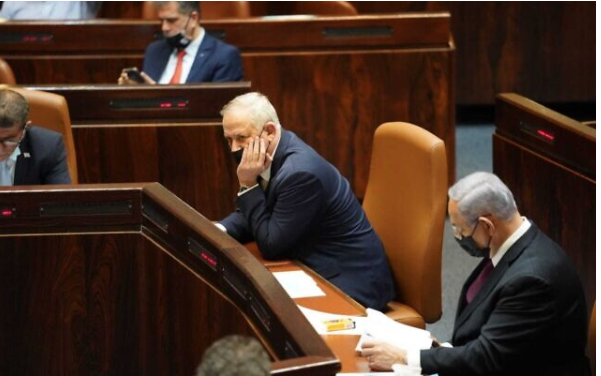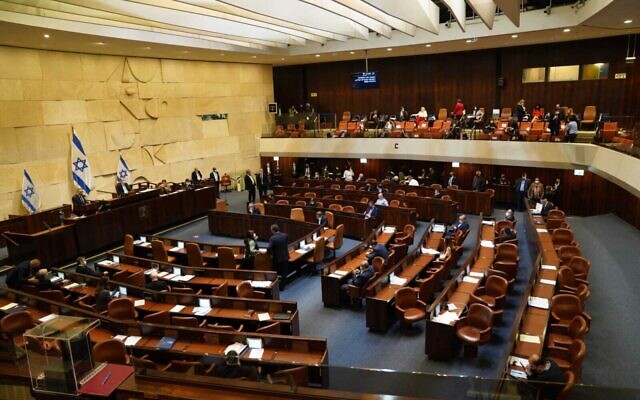

Opposition motion passes 61-54 after support from Blue and White, but must still pass three more readings before new national vote called.
By MICHAEL BACHNER
The Knesset on Wednesday passed a bill to dissolve, setting the stage for the fourth round of national elections in two years as Defense Minister Benny Gantz and his Blue and White party broke from the coalition and voted in favor of the measure.
The bill passed with 61 MKs voting in favor and 54 against.
Gantz’s support for the opposition bill will likely spell the end of his ill-fated power-sharing partnership with Prime Minister Benjamin Netanyahu, some six months after agreeing to join a unity government in order to deal with the coronavirus crisis.
The measure must still go through committee and pass three more readings in the Knesset before new elections are called, likely for sometime in the spring or summer.
“The dissolution of the Knesset is not a victory, it’s the first step toward a different government, which will deal with the coronavirus and the economy and won’t cause Israelis to hate each other,” Opposition Leader Yair Lapid, who proposed the measure, tweeted after the bill was passed.
Coalition whip Miki Zohar, a Likud party ally of Netanyahu’s, accused Blue and White and the opposition of again “dragging” Israelis to the ballot box.
“The only thing in common between the factions that make up the opposition and Blue and White is their ambition to harm Netanyahu’s tenure,” he wrote on Twitter. “This is a sad moment for the Israeli people.”
Gantz on Tuesday night announced he would support the measure, accusing Netanyahu of committing an “economic terror attack” by refusing to allow the 2020 and 2021 budgets to move forward.
If the Knesset dissolution bill isn’t ultimately approved, the government has until December 23 to pass a 2020 budget or the government will fall and elections will automatically be scheduled for March 23, 2021.
Meanwhile, an opinion poll predicted a new election would see a comfortable majority for the right, including the opposition Yamina, which has emerged as a potential rival to the premier’s Likud party. However, the survey indicated it was unlikely that a government not headed by Netanyahu would be formed.
The plenum convened at 11 a.m., with the vote to dissolve the Knesset held several hours later as it was the last item on the agenda.
Before the vote, Lapid urged lawmakers to support the bill, railed against the government’s handling of the pandemic and accused the political leaders of destroying Israel’s social fabric.
“You don’t have a clue what you’re doing. You took the incredible abilities and resources of the Israeli public and made everything political,” he said. “It’s all political interests and the prime minister’s legal strategies, and tax benefits for Netanyahu and jobs for your friends. You care only about yourselves and in the meantime, Israel isn’t being taken care of. You’re putting our lives in danger. You’re putting our economy in peril, abandoning our parents, setting fire to our children’s future.”

Ahead of the dramatic vote there was last-minute scrambling within the predominantly Arab Joint List, whose Islamic religious Ra’am faction eventually decided not to support the bill and sit out the vote amid a warming of relations between its leader, Mansour Abbas, and Netanyahu.
Other Joint List members used their speeches in the plenum to plead for unity within the Arab alliance and argued against the dissolution of the party, which is a potential consequence of Ra’am’s decision. Before the Knesset discussion, many party members posted detailed statements about why the bill must be supported and expressed implicit criticism of Abbas, without mentioning him by name.
Meretz leader Nitzan Horowitz slammed Gantz for entering the government in the first place, saying that its driving force was Netanyahu’s personal interest to evade corruption charges against him.
“Had you listened to us, Benny Gantz would have been prime minister and Netanyahu would have left [the Prime Minister’s Residence on] Balfour [Street] long ago,” he said, addressing Blue and White. “Some in our camp spat in the face of the voters, reneged on all their promises and crawled into this government of shame and disgrace. Those who viewed themselves as leaders of the camp gave up when the battle began.
“In the coming elections, the public won’t vote for parties with Trojan horses,” Horowitz added.
Meretz MK Tamar Zandberg echoed that sentiment, disputing Gantz’s statement Tuesday night that Netanyahu had not lied to him personally, but rather to the Israeli people.
“Netanyahu lied to you, and you fell for it,” she charged. “As the memes say: You had one job! But even this you didn’t manage,” she said. She also called for political cooperation between Jews and Arabs in the next election.
Despite the passage of the motion, the government won’t automatically fall. After the preliminary reading, the bill will go to the Knesset’s House Committee — controlled by Blue and White — where it is reportedly likely to be held at least until Monday to provide a chance for last-ditch talks with Likud, which reports say are unlikely to yield an agreement.
After a committee approval, the bill would have to be supported by lawmakers in three more readings. If that happens, the Knesset will dissolve and MKs will have to agree on a date for elections, which will happen between March and June 2021.
Likud and Blue and White have been at loggerheads almost since the inception of their power-sharing coalition in May, but ties between the two hit a nadir in recent weeks as the budget deadline nears. Gantz has accused Netanyahu of refusing to pass the 2020 and 2021 state budgets in one shot — as per the coalition agreement — in an attempt to prevent Gantz from becoming prime minister in November 2021, also as per the coalition agreement.
Under that deal, the only scenario in which Gantz won’t become premier (apart from Blue and White causing the fall of the government) is if the government dissolves due to failure to pass the budget by the deadline.
Gantz said Tuesday that he could no longer support the government and that his party would support the bill to call early elections.
Describing Netanyahu as “a serial breaker of promises” in a prime-time televised address, Gantz accused the prime minister of lying to the public when he agreed to form a unity coalition between Likud and Blue and White, an agreement in which Netanyahu promised to hand over the premiership to Gantz in November 2021.


“I entered the government with a heavy heart but with a whole heart,” Gantz, who also serves as alternate prime minister, said regarding his May decision to form a coalition with Netanyahu.
“Netanyahu promised unity; he said there wouldn’t be tricks and games. But he doesn’t fulfill his promises and the public ultimately pays,” he said. “Netanyahu didn’t lie to me; he lied to you,” Gantz told Israelis. “He didn’t dupe me; he duped the citizens of Israel.”
Ahead of the vote, Zohar said he hoped Blue and White would make the “rational” choice, keep the government afloat and pass the budget.
“I tend to believe that a person won’t put an end to his political life and won’t bang his head against the wall,” he told Radio 103FM, apparently referring to Gantz.


An opinion poll published Wednesday predicted a continued lead for the right, including a strong showing for the religious right-wing Yamina, which is in the opposition and has indicated it won’t necessarily go with Netanyahu.
The survey, conducted online on Tuesday by Panels Politics and published by Radio 103FM, showed that if Naftali Bennett’s party does end up going with its former partners Likud and ultra-Orthodox parties, Shas and United Torah Judaism, they could form a coalition with 67 of the 120 Knesset members.
On the other hand, a government that includes the Yamina, Yesh Atid, Blue and White and Yisrael Beytenu parties was not possible according to the poll, with those parties combined getting 59 seats, two short of a majority. The left-wing Meretz party could hand that government a majority, but would likely not enter a coalition with Yamina and Yisrael Beytenu.
That means Netanyahu would likely remain prime minister after the election.
The poll gave Likud 29 seats and 23 for Yamina, 18 for Yesh Atid, 12 for the Arab Joint List, 10 for Blue and White, eight each for Yisrael Beytenu and Shas, seven for UTJ and five for Meretz.
The poll indicated that a potential new party headed by Tel Aviv Mayor Ron Huldai would not be a political gamechanger and would garner just four seats — taking two from Blue and White and one each from Likud and Yamina.
Asked who was to blame for the country apparently going to another election, 48 percent said Netanyahu while 30% blamed Gantz. The rest said they didn’t know.
The poll was conducted online among 523 respondents constituting a representative sample of Israeli adults. The margin of error is 4.4%.
Source: The Times of Israel






